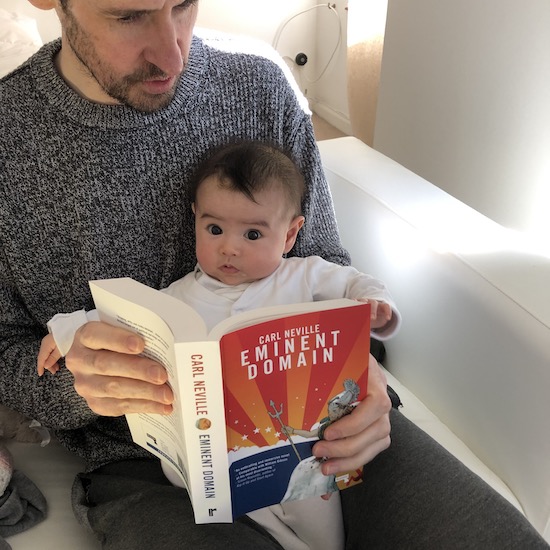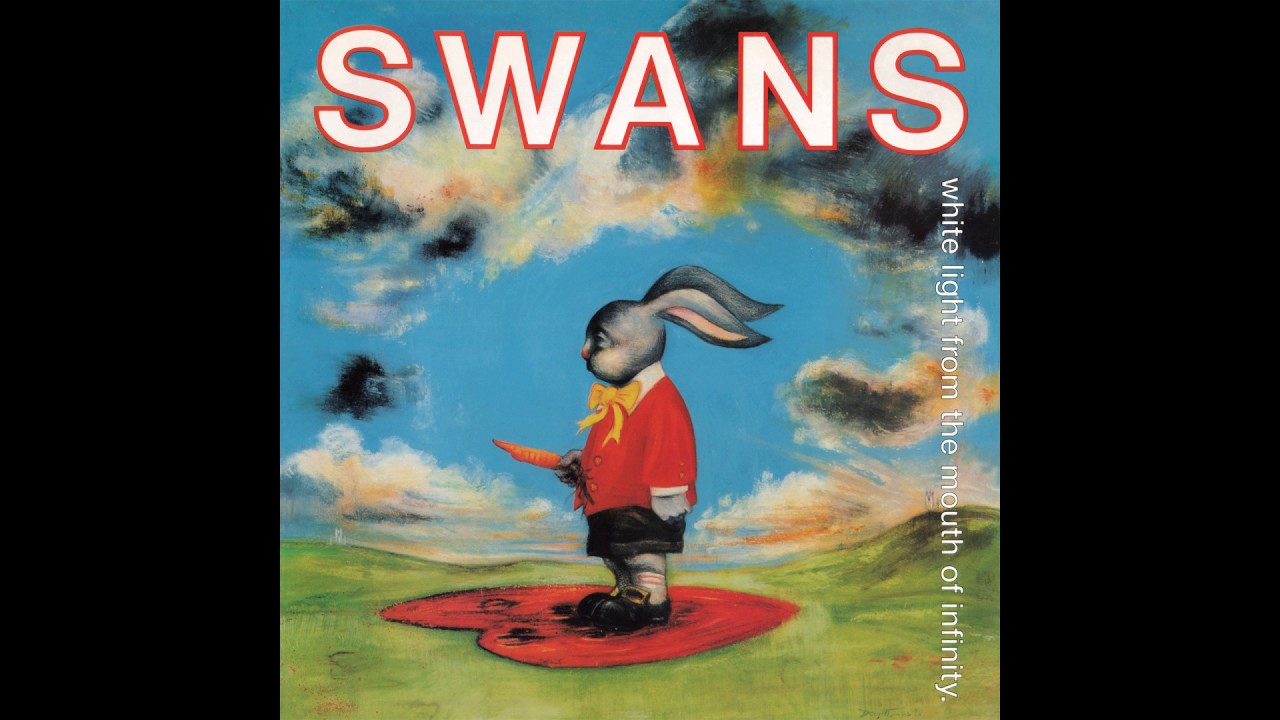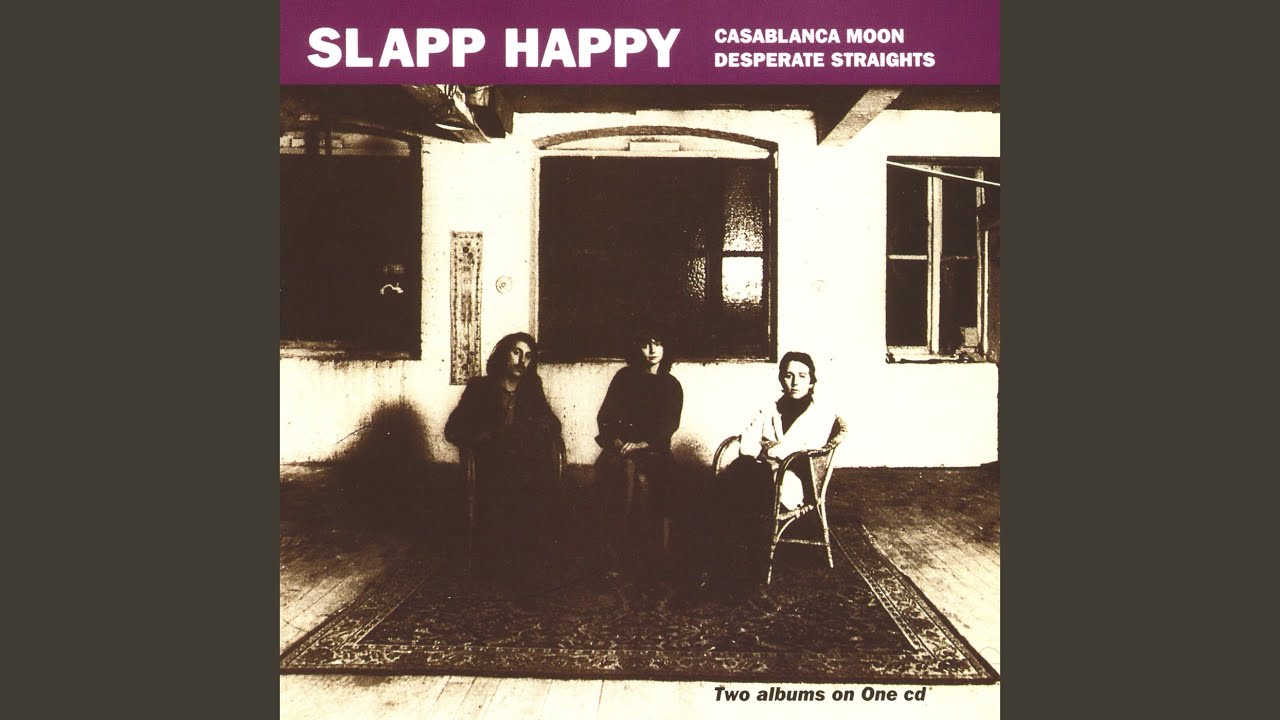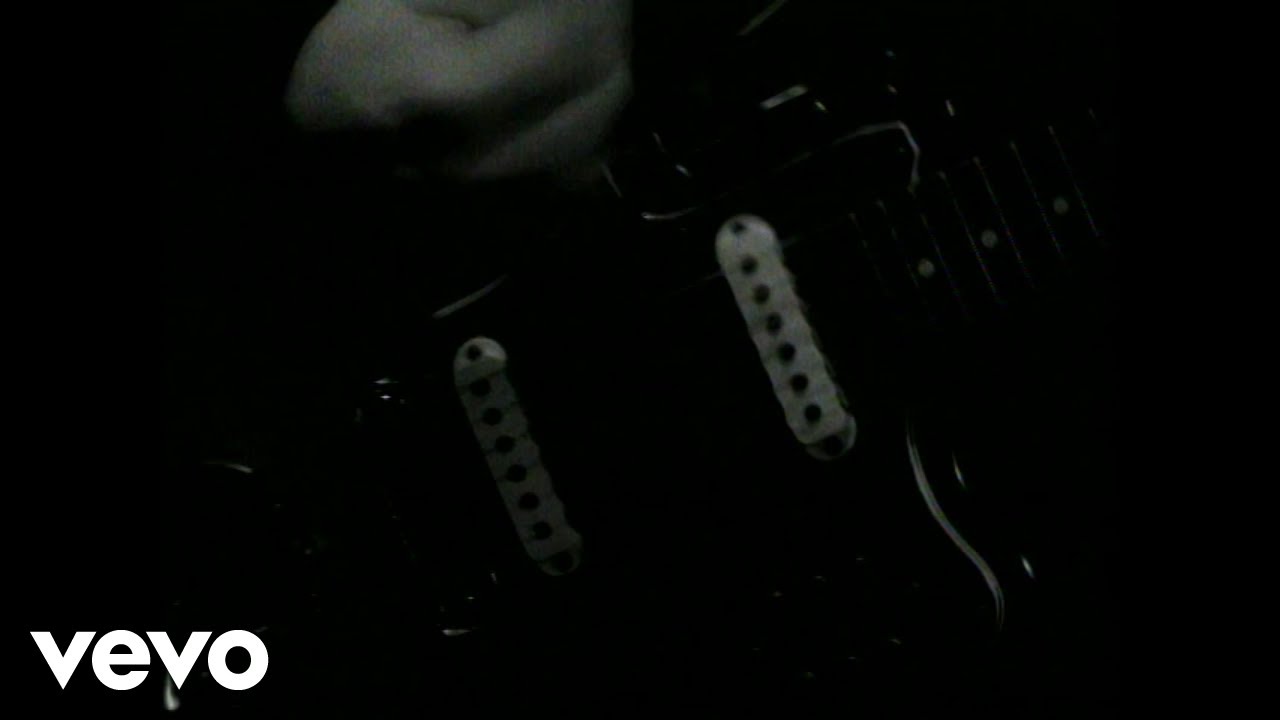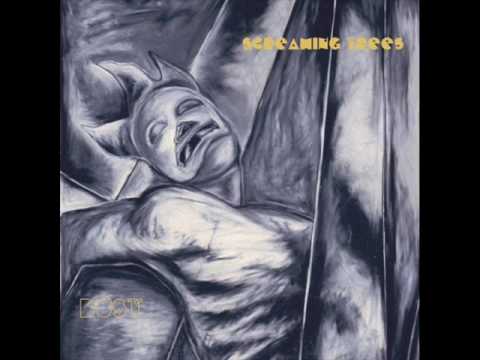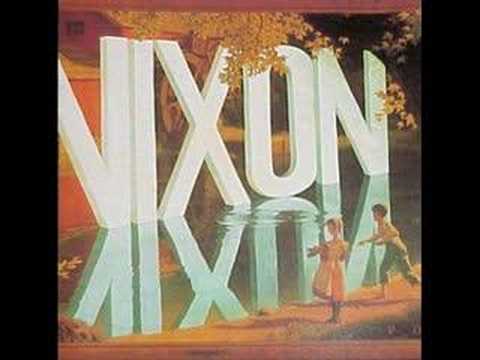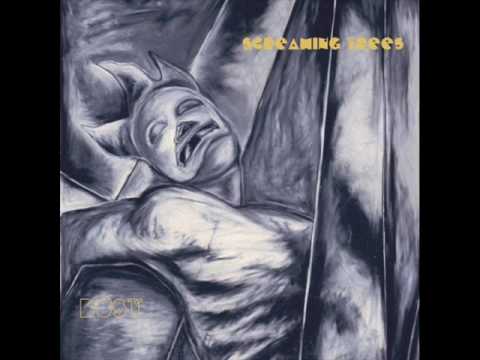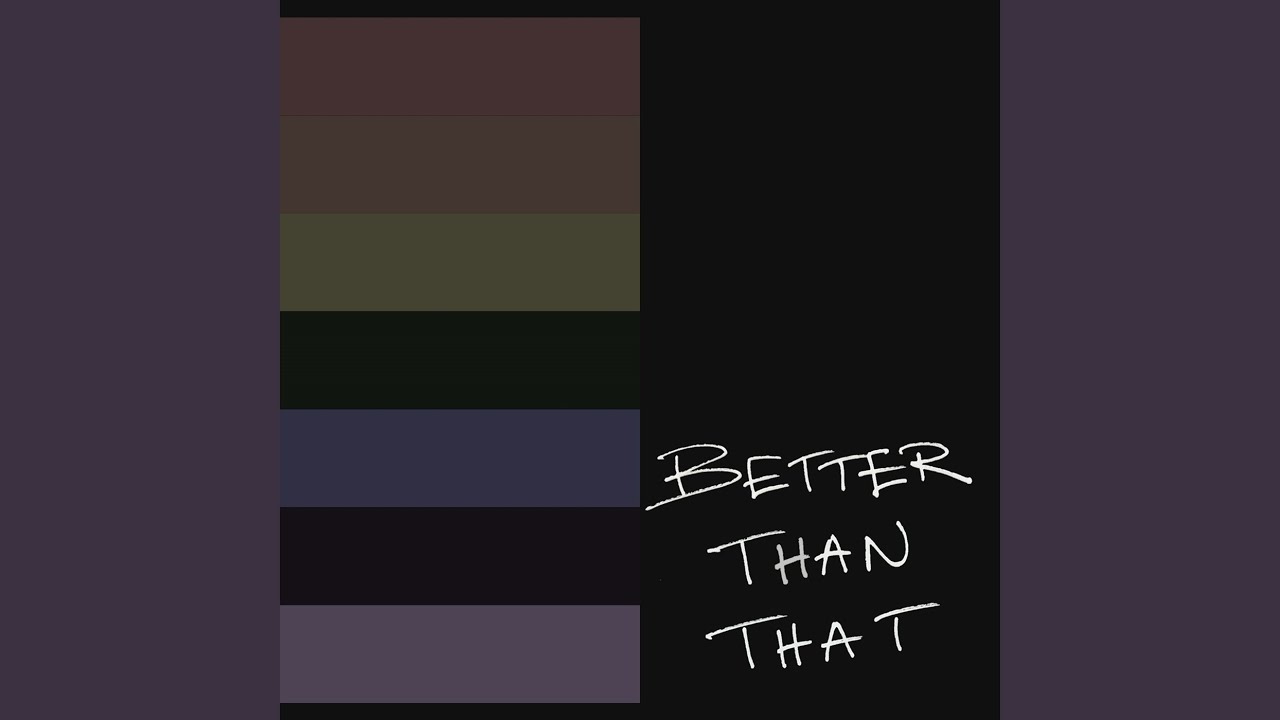Carl, they asked me, would you like to write a piece to promote your counterfactual neo-modernist Utopian Acid Communist Blockbuster-in-Waiting, Eminent Domain? Perhaps discussing its dialectical relationship to the earlier instalment of the sprawling pan-dimensional dyad it forms with the dystopian Resolution Way? In the pages of the hallowed left-field online Bible of all things underground, vanguard and outer-limits, The Quietus? Looking at the music that influenced the book?
Love to. Especially given that for my own trainspottery and obsessive entertainment as much as anyone’s I had just finished putting together some Spotify playlists for said novels.
Let’s see, then. How to summon up the right balance of experimental but also popular, retro yet hypermodern, Anglo-folksy but also Afrofuturist? Or perhaps rather than balanced-yet-surprising eclecticism suggesting range, reach and intellectual acuity, I could instead deep-dive a particular seam of obscure underground music-making, or find a single, neglected artist, thereby bringing to light an undeservedly lost, outsider genius rather as the central character Alex Hargreaves does with Vernon Crane in Resolution Way? A good opportunity to present to some imaginary others (but of course, really to myself) an impeccably curated version of Carl Neville, author and all round smart guy.
But then I was given pause.
One of the conceits in Eminent Domain is that in the People’s Republic of Britain, the alternate society in which the action is set, our ubiquitous social media and smartphone technology has been repurposed to democratic ends, allowing for enhanced political engagement, the provision of social services and the allocation of work. A number of apps, styled plets in the book, record and aggregate all previous online interactions and perform several of the democratic duties that you are obliged to participate in on your behalf.
The data that accrues is generally accessible to the population, except for the very highest or deepest level of aggregation, which is kept by the central security body SSF. There is a push by some members of the PRB, possibly subversives, to open up and grant access to these files to the public. Most citizens allow the plets to go about their business, running in the background and making choices for them, drawing on prior choices, building up a kind of algorithmic unconscious that, potentially, offers a traumatic insight into the true interests attributes and motivations of an individual PRB citizen above and beyond their professed beliefs. Consciousness filters out and shapes self-image to render it idealised and coherent, but the data file, once opened, reveals the real self.
So, what was I actually listening to while I wrote it, given that I almost exclusively listen to music on Spotify these days and that the 2019 Rewind playlist in the Made For You section was just a click away? What real would I be confronted with when the data displayed my true image back to me?
Serialism? Cutting-edge millennial conceptronica? Obscure Acid Rock of the 1970s? Impeccably heterogeneous selection of experimental and outernational classics? Maybe even…
Jazz?
My finger hovered over the mouse pad.
Go on, a sultry, Mephistophelian voice whispered at me. Click that playlist open. Know Thyself!
Well sure, whatever, I mean I of all people….
Oh God!
Grant Lee Buffalo, Fuzzy
Now, somewhat along the lines of Withnail’s desperate attempt to not get a leathering from the thick-necked Irishman in the pub in Withnail and I, what can I say as an excuse for what follows other than “my wife is having a baby”?
Yes, probably, the reason I listened to so much tasteful, tuneful, well produced, expertly crafted post-Grunge, Buckley-adjacent rock and lite-Americana last year was down to the fact that 2019 was the year that, rather late in life, I became a father.
I would be lying if I didn’t acknowledge that for all my advanced years, maturity, wisdom, calm head in a storm and capacity for seasoned reflection on the follies of my fellow man I wasn’t anxious. I mostly feared I wouldn’t be able to help my partner during the delivery due to my own squeamishness. Manly as I am in certain respects I am also a lover of poetry, sensitive to beauty, music-obsessed and precisely the kind of perfumed ponce to whom the Irishman objects.
I am a fainter, a hider behind the hands. I can’t even get a blood test without wilting, and I wanted to be supportive, even active, not spark out on the floor at the back of the delivery room legs up on a chair, a six foot four long streak of pale and useless forty-nine year old snowflakery.
So, but, also, yes, I do love those Grant Lee Buffalo albums. There’s a seam of theatricality about them, they are part of a long continuum of dandyism, vaudeville, music hall and glam which is why they probably ended up on the Velvet Goldmine soundtrack along with other, even archer proponents of guitar-lead, angular and experimental camp, all-time favourites of mine, Shudder to Think.
They were one of those bands I ignored at the time having heard their earlier and underwhelming incarnation as Shiva Burlesque, but by the time they got through to Fuzzy the album this track is from, their songwriting is leaps and bounds ahead and their next, slightly rockier album Mighty Joe Moon is probably even better.
In terms of silvered swooning and lovelorn, slow and shadowed glides through memory and yearning, few have done it better. Through all the dappled intimacy you can hear the great, soughing breath of the unlived and unacted, half-loss, half-escape infusing everything. The moment of insight that reconciles as it estranges is also a form of capture and suspension; you are held fast and contradictory impulses roll through you, the point of confluence conventionally called the bittersweet.
Plus it’s got more hooks than a tackle shop wholesalers
Swans, Blind
This track popped up as the autoplay function spun on after some other playlist had finished and I was immediately struck by, well, all manner of things: the depth of Gira’s voice, its great rolling depth, the grit and sediment that the years have ballasted it with, the beatific almost Krautrock-y sparkle, ebb and flow of the music, and then of course, the lyrics.
Some people think lyrics aren’t important or claim not to really notice them (but nonetheless often quote them in defence of a particular critical interpretation of the band). For me lyrics are a key pleasure and I often listen to artists as much because they are great writers as I do their other qualities. And ‘Blind’’s reflection on the dazzling but limiting sense of invulnerability that young manhood brings and the slow humanising of the decline/ascent into middle age is a great and necessary bearing of the soul.
Often, in circumstances such as the ones though which I “discovered” ‘Blind’ I imagine that Spotify has churned up some obscure track and that my especially refined ear has identified its otherwise unacknowledged qualities, only to find that usually it’s the first or second most listened-to track by that band. I find this fact quite comforting, ultimately, a sort of universalism. We all know deep down that ‘Blind’ for all its relatively conventional singer songwriter structure is vastly more appealing than, I dunno, much as I like it, ‘Big Strong Boss’ from Filth. It could just be that a lot of people are mellowing out along with bands they liked in their more amped up, nihilistic and despairing youth. I recall after all that I stopped paying attention to Swans after they sold out and covered Joy Division and went blues-y in the mid 90s. I was disgusted, what a cop-out!
But I was younger then….
Slapp Happy, The Drum
Have I mentioned that I became a father last year? December the 3rd at 4 pm to be precise, nearly two weeks past the due date, in fact. I made a playlist for my unborn daughter (honestly it’s any excuse with me) and that, therefore, got a lot of play, lying in bed at night trying to coax her out.
This particular track is far and away my favourite of Slapp Happy’s, though I heard it first in the version by Bongwater a band I was extremely fond of in my younger days. It’s suffused with a playful, ramshackle spirit, full of generosity and joy, a romp. The version available on Spotify is from Casablanca Moon (not the rerecorded, rockier Acnalbasac noom). The low-fi, hippy squat ambience and simple sing-a-long melodies, the half-submerged drum and scattered and fluttering whistling and flutings, along with the cooing and naive lyrics all suggest a world not quite yet in focus or fully pinned down, a half-state in which everything still shifts, changes and is magically dancing. Few songs invoke the disorderly and uncoordinated, piecemeal attention and way of being in the world of childhood so well.
Cass McCombs, Brighter
Another imminent-baby playlist song. McCombs work is often, to be honest, quite workmanlike and dreary but he has a couple of really lovely tracks, of which this is one.
Now this is not in fact, objectively, the best or even my favourite Cass McCombs song and the way it has woven its way into the fabric of my life and now triggers a very particular set of responses is highly context specific. It’s probably too sugary if you are not in need of some level of emotional reassurance or feeling sentimental or maudlin, but for me the twinkling and crooning, set against the dark velveteen backdrop made me imagine her, tiny speck of light and life slowly growing and forming there in the warmth and dark. The song draws on ‘Satellite of Love’, modulates Reed’s deadpan, flattish vocals up into the higher reaches of McCombs’ falsetto and that too speaks of growth, development, unfurling, “Brighter Venus, brighter star…”
To be honest though, ‘Brighter’, nice as it is, is not a patch on ‘That’s That’, his best song, which appears to be the richly condensed Urtext to the entity of Vampire Weekend’s resplendent Modern Vampires of the City, an album I initially found uninspiring but which grew to become on of my favourite records of the past few years. Plus it’s got more hooks than a junior school cloakroom.
Aright so it is a bit twee, I mean what do you want me to be listening to at that point in expectant fatherhood, ‘Birth/Death Experience’ by Whitehouse or something?
Well, what’s next, let’s hope it’s some Japanese new age from the 80s or autotuned ambient dancehall I mean, give me something to impress them with…
Dear god. It’s Screaming Trees.
Screaming Trees, Dollar Bill
Screaming Trees, Look at you
We are down to six and seven now and I am to be honest not sure this is a good idea anymore.
Jesus. Maybe, I don’t actually like any of the stuff I claim to be into. Has it all just been a great life-squandering pretence, a posturing surface-level radicalism, a performance enacted and re-enacted, constantly bolstered through all those tedious nights watching The Necks at Café Oto and John Adams at the Barbican, Sunday mornings waiting for the night bus back from Elephant and Castle after yet another Hyperdub night when I could have just been curled up snug with my age-appropriate Bush and Carter USM CDs in a house I actually owned, with a car I could actually drive outside and a gold-plated pension I could actually spend waiting for me somewhere down the line, my engagement with art amounting to little more than leaving the occasional comment about real music not existing anymore and how I feel sorry for the youth of today under Taylor Swift videos on youtube?
Well, ‘Dollar Bill’ I quite like. It’s straightforward blues-rock but has a bit of swing and still packs a pinch of poignant punch but ‘Look at You’ is both dreary and lugubrious and I have no idea why I would have hit repeat on that particular track so many times in retrospect. That just looks like inexcusable bad taste. There are certainly better Screaming Trees tracks, their version of ‘Gospel Plow’ for instance. Apparently Liam Gallagher repeatedly referred to them as Howling Branches when they supported Oasis on a U.S tour. So that’s one thing to like about Liam Gallagher.
What’s next, Carl? Beady Eye? High Flying Birds? Oh, ha! Look, it is Threnody for the Victims of Hiroshima by..
Actually it’s Lambchop.
Lambchop, You Masculine You
Hmm, that title’s a bit suspicious-making…
Again, another band I paid absolutely no attention to at the time. And this, like a lot of Lambchop stuff with the billowing, building orchestration and the cherubic falsettos offers something strangely otherworldly and also end-of-world-y, a kind of soft-focus apocalypse, deep, downy, cloud-like.
With Lambchop we have an illustration of what we might call the insidious power of blandness. At first I listened to it because it filled up cranial space like a great tuft of sonic cotton-wool. Background music. Just interesting enough to make a minimal claim on one part of your attention, leaving another free to focus on more pressing concerns. Then, once it has functionally drifted past more or less unnoticed for several consecutive listens suddenly you find yourself hooked.
More hooks than an Abu Hamza look-a-like convention.
Without the soporific, calming and levelling qualities of mid-90s Americana perhaps I wouldn’t have got the book written at all. What we are talking about here I guess is the psychoactive and narcotic qualities of music, music as a neurological event as much as an expression of taste or a critical, ideological stance. There was a blog many years ago which captured the extent to which music is used as a mood and consciousness alterer called Drogarse con musica (drug yourself with music), and it’s a significant question, the extent to which music has allowed many people to manage their symptoms, become a necessary support mechanism, supplement, just as much as popping pills.
Equally significant perhaps is the extent to which the widespread dissemination of music through platforms like Spotify, its superabundance, immediate accessibility and capacity to be consumed everywhere via earbuds has been a palliative for the 24/7 stresses of Late Capitalism. Music as a vast, ever present coping mechanism.
Will you cope, Carl? On the big day? I mean at a minimum you want to be up to the big stuff, love, life, death and all their demands, not live your life in hiding while other more robust, braver people get on with a full life and you skulk in an eternal teenage bedroom of the soul trying to build a protective wall out of your books and records and your big words…
Is that what you have done?
Quick. Don’t think too much about it, get some music on. What’s next?
Cass McCombs, County Lines
It’s all a bit American this, izzit? Then again, I am quite pro-American and I grew up with and have effortlessly maintained a strong attachment to Heartland Rock. Maybe that is overstating it; I just really like Bruce Springsteen.
The vastness and emptiness, relative un-mappedness of America still seemed to hold out the promise of transformation and discovery when I was a kid. You could get lost there, reinvent yourself, there was a scale and extensity, an American sublime next to which Britain was dreary, cramped and narrow. This track is the road trip in a more elegiac mode, slow and stately, with that gentle vibrato rippling out at the end of the long, sustained vocal lines like a surge of excess current through power cables strung out along the roadside as a desert dusk comes down
Travelling, crossing thresholds and breaching barriers was much on my mind anyway, probably always is. The places, people, selves you have left behind all waving forlornly at you in the rear-view mirror. Those up ahead waiting to be embraced. Even if you stay in one place all your life you are condemned to undertake a journey.
Getting close to the end now, Number 9 is…
Oh FFS. It’s more Howling Bran…, I mean Screaming Trees. What initially looked like a
stray, excusable sapling or two is rapidly becoming an incriminating thicket.
Screaming Trees, Dying Days
It’s pretty standard post-grunge bar room rock and yet at some point over the last eighteen months or so it must have swelled my soul or at least mitigated against the tedium of a working day sufficiently for me to listen to it more than, say, ‘Primitive Painters’ by Felt, somewhat lower down on the list (honestly!), but infinitely hipper and frankly “better”. But, y’know also, maybe a bit less catchy and swaggering? A bit wan and wimpish. A bit pale and fey. Maybe Carl, you felt Felt was a bit too close to home?
Who knew that it would take Spotify, post-grunge and an ill-chosen attempt to subvert the genre of crit-theory hipster self-reflection to reveal the timeless insights of Kristeva’s Strangers to Ourselves in all their traumatic, transformative truth.
Though it would be fair to say that over the last two years or so I have become a big Mark Lanegan fan, mostly because his solo output is vastly superior to his Screaming Trees work – especially Gargoyle and the superb Blues Funeral. I like Lanegan’s voice. Its subtle versatility has allowed him to collaborate successfully with others over the years and I am by now pretty familiar with it. One of the beauties of artists having such long careers these days, as with Michael Gira above, is hearing that voice warp, crack and be repurposed over the decades.
Cash Savage, Better than that
A bit of a geographical outlier here at least, but otherwise it’s also straight bar room rock from that greatest of all Rock and Roll nations, Australia. I hyperbolise for provocative effect no doubt, but still: AC/DC, Radio Birdman, The New Christs, The Saints, The Birthday Party, The Cosmic Psychos, Hunters and Collectors, The Drones, err… Lazertits!?
I listened to this track for the most pathetic reason imaginable initially. I had a row with a family member and we fell out for a while, and so I probably spent my time with it in the headphones in a lather of self-righteous indignation. Now, listening back I wonder whether I wasn’t also secretly addressing myself. Be better than this, Carl!
Had I behaved pettily, overreacted? Probably. We have all had, at some stage, that special someone in our lives who is more free with their criticism of you than you can be of them, though no doubt you have also been that more critical party ourselves in relation to still others too and the song does capture that unequal relationship and its irritations and disappointments well.
So that’s that! There they are, the songs that supplemented the writing of the book and, probably worked their way into its themes.
And the birth? Well, I was fine, I even helped during the final few pushes, getting a bird’s eye view of the whole process as the doctor guided little Sookie out with a ventouse cap, gave me my first sight of our tiny daughter’s beautiful, pickled, puckish little face, then the rush as the rest of her came through, the rubbery unspooling metres of umbilical cord that the midwife, a model of composure and professionalism, expertly presented for me to cut. Just another day at work for her, another demonstration for me that the theatre of the mind and the lived existential moment seldom overlap. For good or ill.
And as my partner got stitched up, oblivious to it all now as she cradled the baby and the bloody tissues went in the dish on the tray next to the placenta. I retired to the toilet for a few moments and allowed a vast compound of emotions to roil me. Awe at my partner’s extraordinary tenacity and strength, the profundity of seeing a new life emerge into the world in all its blind need; need for care, shelter and warmth, the need to be nurtured, to be allowed to unfold. Thoughts of how she would grow and flourish in the light of the love we would give her flooded through me and well, it’s over, now, you’ve been some use Carl, we got there, and at last, at last…
I would be able to go back to listening to Sutcliffe Jugend.
With the whole family.
Eminent Domain by Carl Neville is published by Repeater Books. Read our review by Paul Raven here

